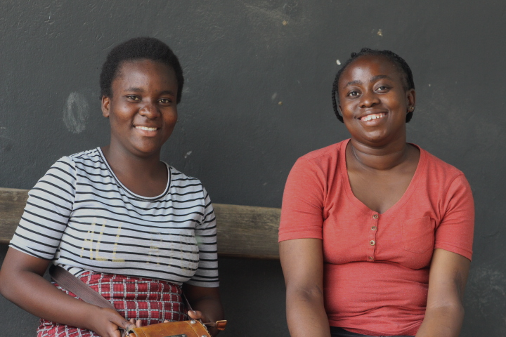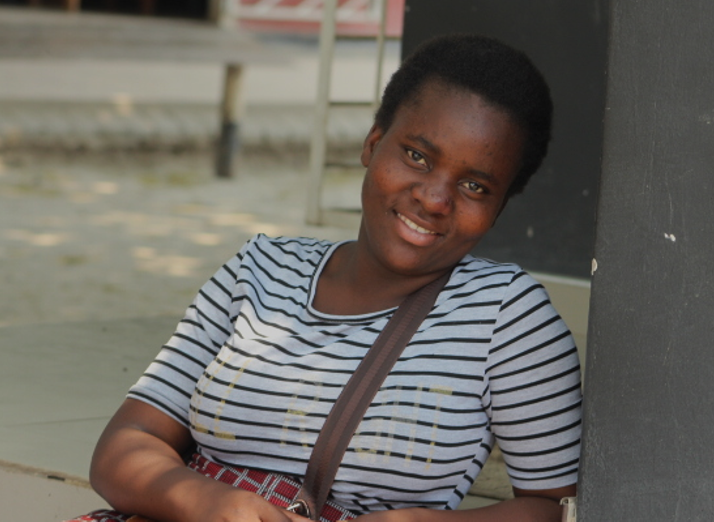Building a Community of Knowledge and Hope for Youth Living with HIV in Zambia

Of the nearly 2 million adolescents living with HIV around the world, over 60% are girls and young women ages 10-24 and 80% live in sub-Saharan Africa. These young people not only face the complexities of navigating the transition into adulthood, but they also must manage a chronic disease as they do so. On top of that, HIV services often lack the youth-friendly care and integrated mental health and sexual and reproductive health and rights (SRHR) information and services that youth living with HIV need and desire, which makes adherence to antiretroviral therapy (ART) difficult.
Nasilele is one such adolescent living with HIV in Lusaka, Zambia. Nasilele has never known her father, and she lost her mother when she was only 6 years old. After her mother’s death, which was suspected to be HIV-related, Nasilele and her three siblings were given a test, which found that she and her younger brother were HIV-positive. Nasilele began taking medication, but her status wasn’t disclosed to her until she started refusing to take her meds when she was 11 years old. At the same time, she and her siblings had been neglected by their extended family and left to fend for themselves.

“I never understood why I was taking medicine from a young age at a consistent time every day despite not being sick,” Nasilele, now 14 years old, recalled. “So I started hiding and refusing to take the pills. It was then that my elder brothers sat me down to explain what HIV was, disclosed my status, and what it meant to have it.”
For Nasilele, learning her status was one of the most difficult experiences of her life — as it can be for so many youth living with HIV.
“The news had a negative impact on my outlook on life and I went through a series of emotions — from being angry with my mother, to being scared of the judgement that would come from society,” she said. “My own extended family had neglected us. Every time I heard a misconception about living with the virus, it would mentally affect me.”
But things changed for Nasilele one day when she was passing by a local clinic and met Ruth Mwaba, a Grassroot Soccer (GRS) Zambia Coach from her community. Ruth introduced Nasilele to GRS’s SKILLZ Plus program: an interactive, evidence-based, and youth-friendly intervention that uses soccer and play-based learning to address the specific needs of youth living with HIV.
The SKILLZ Plus curriculum is designed to build the individual assets of youth living with HIV, empowering and supporting them to live happy and healthy lives and to become leaders within their community. Implemented in partnership with local health clinics and facilitated by near-peer mentor Coaches like Ruth who are openly living with HIV themselves, the program addresses different aspects of living with the virus — such as prevention and transmission, adherence to ART, disclosure, healthy relationships, and mental health.
SKILLZ Plus was designed in Zambia in 2012, and since then the program has expanded to South Africa, Zimbabwe, and Malawi and engaged more than 10,600 youth living with HIV. Evidence shows the program is having a meaningful impact on participants. Baseline findings of a longitudinal cohort study of adolescents undergoing multiple SKILLZ interventions indicates that youth living with HIV attending SKILLZ Plus report strong ART adherence — 80% of adolescents surveyed in health facilities in Zambia said that they follow ART as directed.
GRS recently signed on as the lead adolescent-focused partner on one of PEPFAR’s flagship HIV-treatment initiatives in Zambia, with plans to reach 15,000 youth living with HIV over five years and position SKILLZ Plus for national scale up with the Zambian Ministry of Health. As part of another PEPFAR-supported project, GRS SKILLZ Plus Coaches are collecting data on HIV service delivery and advocating for improved services to national- and provincial-level stakeholders.

For Nasilele, participating in SKILLZ Plus was life-changing not only because of the knowledge about living with HIV that she learned from her Coach, but also because of how it empowered her and strengthened her self-esteem.
“Through attending the program, my self-esteem has been built to a point that I was able to join the debate club and stand in front of crowds to express myself without the self-stigma,” she said. “I have learned how to become a peer educator and use poetry, a hobby that I love, as an outlet for any negative emotions I may experience.”
And because her Coach and fellow participants were also young people living with HIV like her, the program provided Nasilele with a community, bonded by a shared experience, that encourages each other and builds a sense of collective agency. “Thanks to Grassroot Soccer, I have been able to make a lot of friends — ones that I can easily feel free to share my status and relate with,” Nasilele said.
SKILLZ Plus has been and continues to be helpful to Nasilele. Even though she graduated from the program, she goes back to the youth center at her local clinic where the program is delivered every Saturday to spend time with GRS Coaches and new program participants. She also recently joined a GRS SKILLZ Club, where she and her fellow participants and Coaches can continue to discuss topics related to living with HIV and remaining on treatment.
Now, Nasilele’s goal is to open up a small business to help her older brother in taking care of their family — and to train to become a GRS SKILLZ Coach herself. That way, she can support youth living with HIV in her community navigating a challenging and complex time of their lives, just as Ruth had done for her.

